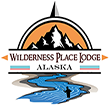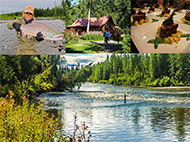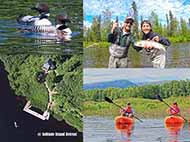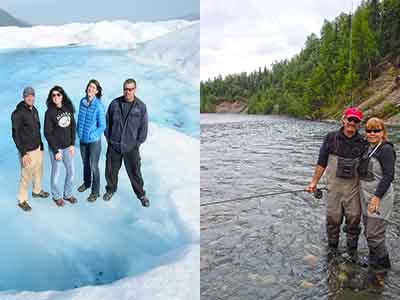Alaska Articles: Plan your ideal Alaska fishing trip
Fishing Lodge Home › Alaska Articles › Plan your ideal Alaska fishing trip
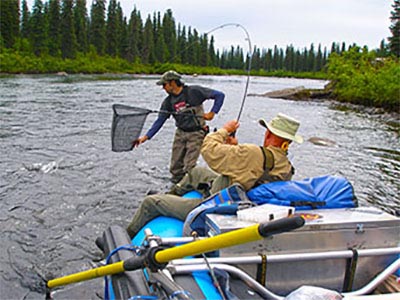 October 1, 2020 - Planning a fishing trip to Alaska can be a daunting and sometimes overwhelming endeavor. There are thousands of destinations spread throughout the largest state in the nation. Sport fishing in Alaska encompasses many unique fish species from the deep sea to tidewater areas, mountain lakes to inland streams. Access to some fishing locales can be a quick 10 minute drive out of town, or up to a one-way 4 hour seaplane ride. There is a fishing opportunity for everyone in Alaska, from novice to expert. Alaska offers world-class fishing adventures for all walks of life. Of particular interest to most is world class Alaska salmon fishing. One destination may be a perfect match for you, but may not fit the likes of another. Outlined below is a simple guide of 5 topics to help choose the Alaska fishing adventure, lodge, or fishing destination that meets your expectations of a truly 'world class' Alaska fishing experience.
October 1, 2020 - Planning a fishing trip to Alaska can be a daunting and sometimes overwhelming endeavor. There are thousands of destinations spread throughout the largest state in the nation. Sport fishing in Alaska encompasses many unique fish species from the deep sea to tidewater areas, mountain lakes to inland streams. Access to some fishing locales can be a quick 10 minute drive out of town, or up to a one-way 4 hour seaplane ride. There is a fishing opportunity for everyone in Alaska, from novice to expert. Alaska offers world-class fishing adventures for all walks of life. Of particular interest to most is world class Alaska salmon fishing. One destination may be a perfect match for you, but may not fit the likes of another. Outlined below is a simple guide of 5 topics to help choose the Alaska fishing adventure, lodge, or fishing destination that meets your expectations of a truly 'world class' Alaska fishing experience.
1.) Salt or Freshwater? Alaska offers many very different fishing opportunities in both salt and freshwater environments. To narrow down the areas of Alaska you will be fishing you must first decide your ideal venue. Decide whether you are interested in pursuing halibut in deep water offshore shoals of the Pacific, or fly fish a pristine mountain-fed tributary for river run salmon. Do you want to troll for large schools of silver salmon in Prince William Sound, or pursue trophy rainbow trout in small fertile inland streams. These are just a few examples of the fishing opportunities in the ocean versus Alaska's inland freshwater areas. Some research in this area is helpful, but your initial decision should be based on your preferred fishing style. Note there many areas in South central Alaska where you can combine a freshwater river experience with a few days of offshore fishing within a few hours drive.
2.) Choose your fishing Style - Do you prefer to fish from a boat? Are you a fly fisherman, or do you wish to learn to master the art? Do you want a combination of spin fishing and Alaska fly fishing trip opportunities? Do you prefer to wade and cast, or sleep in the boat and wait for your bobber to go under? Do you like to fish large rivers, small streams, lakes, oceans, estuaries, etc. How you prefer to fish will help eliminate some destinations that only offer the opposite of what you're looking for.
3.) Do I hire a guide? Well, it's really your choice of course, but I will come right out and say 'Yes, most definitely' Even if you are an experienced angler, Alaska is a much different venue than what you may be used to elsewhere. For experts as well as novices, you have the opportunity to catch many fish here in Alaska with just a little guided assistance. Local fishing guides not only help you to find the fish, but they show you the best techniques to lure them to strike, have knowledge of the local history and wildlife, and also are great companions to have on the water. Guides save you time and help tie your Alaska fishing experience together. And, most importantly, you will be more successful. So, unless you are solely an independent angler, seek areas or operations that offer guided fishing, whether it be an independent guide, or a guide that is included with a resort or lodge package. Guides are not created equal! Be sure to ask detailed questions about the guides and the operations. You will find exceptional guides who are overall good people and go out of their way to make your experience enjoyable, but you will also find some places that have unenthusiastic guides who for whatever reason have not yet realized they have a dream job and spend most of their day sitting in their boat watching you fish. Your guide should have the same enthusiasm to be on the water if you do. Be sure that is a quality you demand when seeking a fishing guide service or one of many Alaska fishing lodges.
4.) On or off the road? Well, obviously if you're fishing in saltwater, you will leave the road system via boat and fish the millions of acres of blue ocean property Alaska is blessed with. In localized areas and hot fishing holes you may be in good company, but seldom will you be battling with other fishermen or other boats. Your biggest competition is the number of other fishermen that will be sharing the boat with you.
When it comes to inland fishing (Alaska river fishing, lakes and streams), you have many options to choose from.
A.) Drive and fish the road system: the most popular and affordable option. There are a number of good salmon streams and trout lakes off the road system, the largest density north and south of Anchorage. You can get into decent fishing in these waterways, but only at specific times of the summer depending on salmon runs. During the peak of the salmon runs on the river systems, you will be fighting for a place to fish. Often times you will end up fishing unproductive water unless you get up at dawn with the masses. Fishing off the road system is busy and there's no way around that. You have many RVers, locals and tourists that stop and fish these areas. People camp on the rivers and lakes and take control of the best fishing stretches. As you drive North, you will see many more rivers, but most are glacial and most do not have salmon or trout. Some of these rivers look as if they would be teeming with fish, but only produce an occasional small grayling or dolly varden. If you want to fish off the road system in Alaska, gain local knowledge and do your research first. Don't follow the crowds or your fishing experience will be a bit frustrating. There are some great out of the way places to fish, but you will want a local guide or connection to lead you in the right direction. The only other way to avoid crowds would be to do a float of a local river, such as the Kenai to access areas of limited fishing pressure. Roadside fishing is the least productive option, but is the most affordable.
B.) Fly out to remote areas: Definitely increases your chance of a great fishing experience, but also a great Alaska experience. Remote rivers and lakes offer less competition and also offers you a choice of what particular fishing experience you are looking for whereas on the road you get what your given. Remote Alaska encompasses almost 90% of the state's land area, whereas the roadside exposes you just to a small fraction of Alaska's vast wilderness. Flying out to a river, lake, remote cabin, lodge, etc. will offer you a better Alaska fishing experience. Again research the options. The further you fly does not necessarily mean the better the fishing. The further you fly does mean the more expensive your trip will be. You do not have to fly 3 hours and spend a ton of money on one or multiple air taxis to get the best fishing in Alaska, so don't believe that's the case. Do your research and find an area that fits your needs from questions 1- 3 above and go from there. Next decide whether your trip will be for a day, 2 days, a week, or whatever. Then, where will you stay, do you need a boat to get up river, are guides available? These questions will be discussed later.
5.)Self-catered trips or booking an organized fishing package? So, you have the choice to do it all on your own, some of it on your own, or have a fishing lodge, camp or resort cater to your every need. Much of this decision comes down to your budget of course, but also depends on how much planning you feel comfortable doing on your own.
A.) Self-catered trips - If you plan to fish for one week in Alaska either by yourself or in a group and choose do plan everything on your own, be aware of the following:
1. Do I have the proper equipment? What will it cost to outfit myself?
2. Where will I be traveling and where will my base be?
3. Where will I stay and how much will it cost to stay there? Do I camp and save money, do I rent an RV, or do I hop from hotel to hotel while on the road?
4. Do I want to fly out somewhere to fish and how much will that cost? Is it cost-effective or even possible for my group to charter our own plane? Where will we fly to?
5. If I fly out to fish somewhere, where will I stay if I do a multi-day trip? How much will that cost me?
6. When we get to our fishing area, where do we concentrate on fishing? Do we need a boat or someway to access the best fishing areas? Float planes land where they can, not necessarily where the best fishing holes are.
B.)Fishing lodges and camps offer a wide variety of services and amenities. The bonus to booking with lodges is you can be assured they are located in an area that has good fishing and they have access to a variety of fishing opportunities. Most lodges have guides and the guides have boats or another means of accessing the best fishing holes. Lodges include accommodations, meals, and many other fine amenities. Lodges limit the risks you will take if you plan a self-catered trip. Some Alaska fishing lodges are all-inclusive and some have hidden charges or non-inclusions. If you plan to visit one of Alaska's many fishing lodges, isolate an area you want to fish based on the criteria in questions 1- 4 above and then search for a lodge in that area based on your budget, your immediate needs, accommodations, guide services, equipment rental availability, etc. Here are some things to consider when researching an Alaskan fishing lodge destination:
1.) Do I want to fish at a lodge on or off the road system?
2.) If off the road system, does the lodge include all seaplane air taxi fees in their package price? (this can add up if they don't).
3.) What am I getting for the price the lodge is charging? How does one lodge's price and services compare to other lodges in Alaska.
4.) What type of fishing and fish species does the lodge offer?
5.) When is the best time of year to visit?
6.) Is there a good variety in the fishing techniques or species available at the lodge?
7.) Do they include guides with their lodge packages?
8.) How many guests fish with each guide?
9.) Do you fish with your group only, or does the lodge intermix you with other guests?
10). How many total guests stay at the lodge? (most often smaller lodges will offer a higher level of service and you will have much more flexibility during your stay).
11.) What would your accommodations be at the lodge? Private or shared? Cabins or rooms? Quality of accommodations and other amenities?
12.) Does the lodge include food service? Do they have kitchenettes in the cabins, or chefs that cook for you? What is the type of food they serve?
13.) Does the lodge have a bar or serve spirits?
14.) Does the lodge or camp have rod/reel rentals and/or tackle for sale or use?
15.) Does the lodge sell fishing licenses?
16.) For the package price, what does the lodge not include for your stay?
17.) What is the lodge's guest return rate? (Returning guests are a very big testimonial for the lodge you are researching).
18.) Overall, what level of service does the lodge offer you? What is the employee to client ratio of the lodge?
19.) How many days or nights can you stay? Can you arrive depart on any day of your choice? This gives you lots of flexibility!
20.) What would your daily fishing itinerary be like? Do you have the freedom to choose your own schedule or is the lodge on a defined regimen? It is all about maximizing your time!
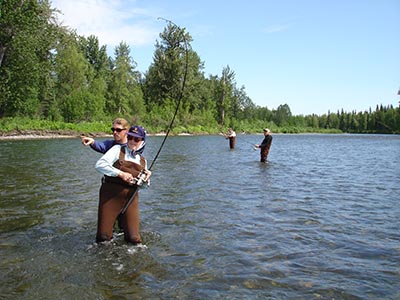 There are obviously many other things to consider when planning a fishing trip to the great state of Alaska, but the above criteria should at least focus your attention on a venue that best meets your interests. Be sure to do your research and ask good questions. There are many great experiences and destinations in Alaska, but not all will be a great match to you. Find something that fulfills your expectations. Good fishing, safe travels and enjoy your stay and fishing experience in this great state of Alaska!
There are obviously many other things to consider when planning a fishing trip to the great state of Alaska, but the above criteria should at least focus your attention on a venue that best meets your interests. Be sure to do your research and ask good questions. There are many great experiences and destinations in Alaska, but not all will be a great match to you. Find something that fulfills your expectations. Good fishing, safe travels and enjoy your stay and fishing experience in this great state of Alaska!
